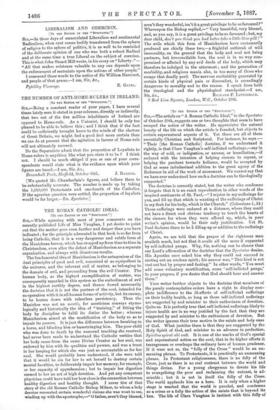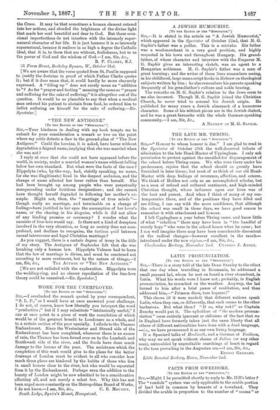[To TER EDITOR OF TEE SPECTATOR."]
Stn,—The article on" A Roman Catholic Ideal," in the Spectator of October 29th, suggests one or two thoughts that seem to have escaped the notice of the writer. He appreciates the natural beauty of the life on which the article is founded, but objects to certain supernatural aspects of it Yet these are all of them essentially Christian and Scriptural. For instance, be says :— "Their [the Roman Catholic] doctrine, if we understand it rightly, is that Clare Vaughan's self-inflicted sufferings,—say in the way of cold, or indigestion, or nausea, or humiliation,—if endured with the intention of helping sinners to repent, or helping the penitent towards holiness, would be accepted by God as some infinitesimal addition to the great agony of the Redeemer in aid of the work of atonement. We cannot say that we have ever understood how such a doctrine can be theologically supported."
The doctrine is correctly stated, but the writer who condemns it forgets that it is an exact reproduction in other words of the inspired sentiments of St. Paul,—" I rejoice in my sufferings for you, and fill up.that which is wanting of the sufferings of Christ in my flesh for his body, which is the Church." (Colossians i., 24.) Those sufferings were endured at a distance, where they could not have a direct and obvious tendency to touch the hearts of the sinners for whom they were offered up, which, in your writer's opinion, would be their only justification. Yet St. Paul declares them to be t. filling-up or addition to the sufferings of Christ.
Again, we are told that the prayer of the righteous man availeth much, but not that it avails all the more if supported by self-inflicted pangs. Why, Sir, nothing can be clearer than our Lord's affirmation of the doctrine that the Spectator denies. His Apostles once asked him why they could not succeed in casting out an unclean spirit ; his answer was," This kind is not cast out but by prayer and fasting." In other words, "You most add some voluntary mortification, some ' self-inflicted pangs,' to your prayers, if yon desire that God should hear and answer them."
Your writer further objects to the doctrine that members of the purely contemplative orders have a right to display com- plete indifference to the ill-effects of self-inflicted sufferings on their bodily health, so long as those self-inflicted sufferings are suggested by and minister to their enthusiasm of devotion. Quite so. It is perfectly true that self inflicted sufferings likely to injure health are in no way justified by the fact that they are suggested by and minister to the enthusiasm of devotion. But the writer ignores their true motive in the saints and holy ones of God. What justifies them is that they are suggested by the Holy Spirit of God, and minister to an advance in perfection. Spiritus spiral ubi vult. It is one of the marks of God's special and supernatural action on the soul, that in its higher efforts it transgresses or overleaps the ordinary laws of human prudence. If it were not so, the "folly of the Cross" would be an un- meaning phrase. To Protestants, it is practically an unmeaning phrase. In Protestant religiousness, there is no folly of the Cross, just as there is no real contrast between the world and things divine. For a young clergyman to devote his life to evangelising the poor and reclaiming the outcast, is ad- mirable ; but it is not in itself the folly of the Cruse. The world applauds him as a hero. It is only when a higher stage is reached that the world is puzzled, and condemns as a crime or a folly the action of the saints that is beyond its ken. The life of Clare Vaughan Is instinct with this folly of the Cross. It may be that sometimes a human element entered into her actions, and clouded the brightness of the divine light that made her soul beautiful and dear to God. But these occa- sional imperfections do not interfere with the intensely super- natural character of her life. It is just because it is so intensely supernatural, because it realises in so high a degree the Catholic ideal, that it is, to them that are without, foolishness, but to us the power of God and the wisdom of God.—I am, Sir, &c., R. F. CLARKE, S.J. 31 Perm Street, Berkeley Square, W., October 31st.
[We are aware that the verse quoted from St. Paul is supposed to justify the doctrine in proof of which Father Clarke quotes it ; but if it does mean that, it could hardly be more obscurely expressed. A " filling up" does not surely mean an "addition to "? As for "prayer and fasting " meaning the same as "prayer and suffering for the sake of suffering," it is altogether out of the question. It would be as plausible to say that when a medical man ordered his patient to abstain from food, he ordered him to inflict suffering on himself for the sake of suffering.—En.
Spectator.]



















































 Previous page
Previous page